Cooking Dominican Style: Private Cooking Classes in Your Rental Villa
Discovering Dominican Cuisine
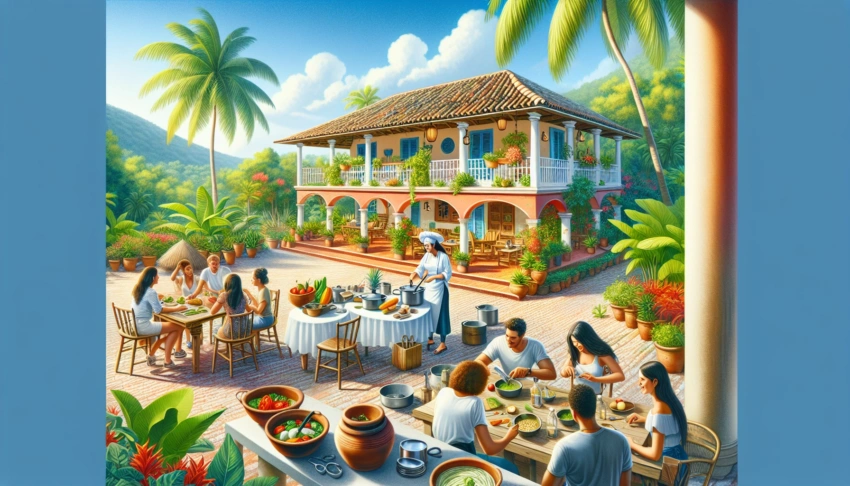
Cooking Dominican Style: Private Cooking Classes in Your Rental Villa
Embark on a culinary journey through the heart of the Dominican Republic, where every dish tells a story and every flavor is a melody of the island’s rich heritage. From the lush fields of its agricultural heartland to the vibrant coastlines bustling with fresh catches, Dominican cuisine is a testament to its diverse cultural influences and historical tapestry.
1. Introduction to Dominican Flavors
The essence of Dominican cooking lies in its bold and vibrant flavors, a harmonious blend of African, Spanish, and Taino influences. This unique fusion has given rise to a culinary repertoire rich in variety and taste.
Dominican cuisine is anchored by a selection of staple ingredients that are both simple and robust. Plantains, a versatile fruit, can be served in various forms, from mangú (mashed plantains) to tostones (twice-fried plantains). Rice, beans, and meats such as chicken and pork are frequently used, providing a hearty base for many dishes.
The island’s tropical climate yields an abundance of fresh produce, including avocados, yucca, and sweet potatoes, which are staples in Dominican households. Unique spices and herbs such as oregano, cilantro, and garlic are essential in imparting the distinctive flavors that define Dominican cooking.
2. Historical Influences
The vibrant tapestry of Dominican cuisine is woven from the threads of its historical influences. The Taino people, the island’s original inhabitants, laid the groundwork with ingredients such as cassava and corn. The arrival of the Spanish brought new elements, including rice and dairy, which seamlessly integrated into the local diet.
The African influence is profound, with slaves bringing over cooking techniques and ingredients such as okra and pigeon peas. Over the centuries, these elements blended into a culinary identity that is uniquely Dominican. Through cultural exchanges with neighboring Caribbean islands and the Americas, Dominican cuisine continues to evolve, reflecting a dynamic history and cultural synergy.
3. Popular Dominican Dishes
Savor the soul of the Dominican Republic through its beloved dishes, each offering a taste of the island’s rich cultural heritage and culinary diversity.
One such dish is La Bandera Dominicana, the national dish comprising rice, red beans, and stewed meat, symbolizing the colors of the Dominican flag. Meanwhile, Sancocho, a hearty stew made with various meats and root vegetables, is a celebration of communal cooking often reserved for special occasions.
Another staple, Mofongo, showcases mashed plantains seasoned with garlic and pork cracklings, reflecting the creativity and adaptability of Dominican cuisine. Equally popular is Chimichurri, a street food favorite akin to a burger but brimming with local spices and flavors.
Each of these dishes not only satisfies the palate but also tells a story of resilience, adaptation, and cultural pride, making Dominican cuisine a profound culinary experience that extends beyond the kitchen.
By embracing the flavors, history, and dishes of the Dominican Republic, you embark on a journey that enriches your understanding of the island’s culture and culinary artistry. Whether you’re a seasoned chef or an enthusiastic food lover, discovering Dominican cuisine in the comfort of your villa offers an unforgettable experience that captures the essence of this vibrant Caribbean nation.
Benefits of Private Cooking Classes in Your Rental Villa
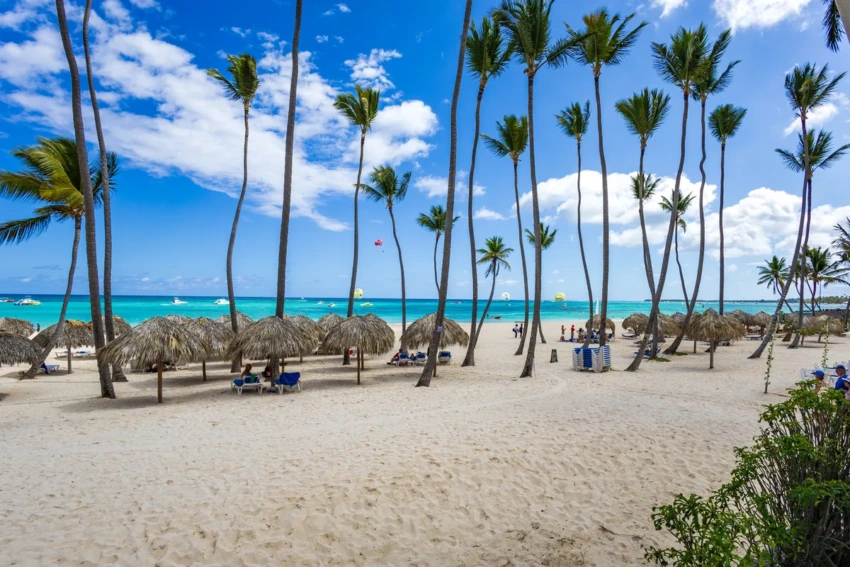
Punta Cana
Imagine the luxury of having a professional chef guide you through the vibrant world of Dominican cuisine, all from the comfort of your vacation rental. Private cooking classes offer a unique and enriching way to engage with local culture while enjoying a personalized culinary adventure.
1. Personalized Experience
One of the most alluring aspects of private cooking classes is the customization they offer. Unlike group classes, where the menu is predetermined, a private session allows you to tailor the experience to your specific tastes and preferences.
- Tailored Menus: Work with your chef to create a menu that intrigues you, whether you’re interested in mastering the art of making mofongo or perfecting a sancocho.
- Skill Level Consideration: Whether you’re a cooking novice or a seasoned home chef, classes can be adapted to your skill level, ensuring you gain new insights and confidence.
- Focus on Preferences: Have dietary restrictions or particular ingredients you love? Your private class can be designed to accommodate these needs.
2. Convenience and Comfort
There’s no need to venture out when a culinary adventure awaits right in your rental villa. This convenience allows you to immerse yourself fully without the hassle of travel or unfamiliar settings.
- Familiar Environment: Cooking in a space you are comfortable in enhances the learning process and makes the experience more enjoyable.
- Flexible Scheduling: Decide when the class fits into your itinerary, making it a stress-free addition to your vacation.
- No Commute: Save time and energy as everything you need comes to you, from ingredients to kitchen tools, allowing you to focus on learning and fun.
3. Cultural Immersion
Participating in a private cooking class is more than just learning recipes; it’s a gateway into the rich tapestry of Dominican culture.
- Hands-On Learning: Engage directly with cooking methods and traditions that have been passed down through generations.
- Storytelling and Traditions: Your chef can share personal stories and insights about Dominican culinary traditions, offering a deeper understanding of the culture.
- Local Ingredients: Gain familiarity with local produce and spices, enhancing your appreciation for the region’s agricultural bounty.
Our Best Villa Cooking Class Experiences in Punta Cana
Our exclusive Dominican cooking experiences are designed to bring the very best of local culinary traditions directly to your villa. Immerse yourself in a class tailored to your desires, whether you’re interested in traditional stews, fresh seafood, or delectable desserts. Don’t miss the chance to enhance your vacation with an unforgettable cooking journey.

Exclusive Ocean View 5-Star Cap Cana Villa for Rent - Chef, Butler, Maid & Golf Cart
from $4600 night Read more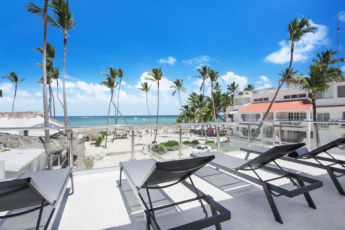
Luxury Villa Right on Los Corales Beach - With Heated Pool, Maid & Chef in Bávaro
from $2995 night Read moreWhat to Expect in a Dominican Cooking Class
A Dominican cooking class is more than just a culinary lesson; it is an immersive cultural experience that engages all your senses. From the aroma of freshly ground spices to the vibrant colors of local produce, each class offers a unique glimpse into the heart of Dominican culture.
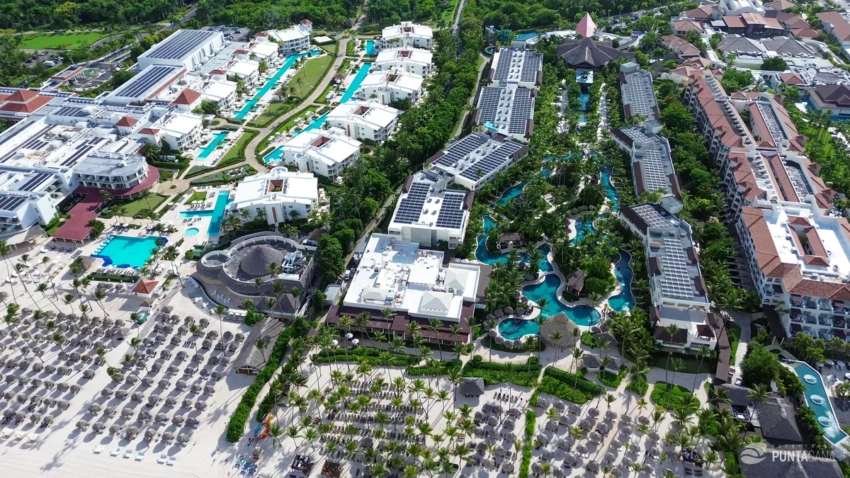
Aerial view of Punta Cana
1. Initial Consultation and Menu Planning
The journey into Dominican cooking begins with a personalized consultation, where you and your instructor will discuss culinary interests and dietary preferences to craft a menu that excites your palate.
During the initial consultation, expect an engaging conversation where you can share your food preferences, any dietary restrictions, and favorite cuisines. This is a crucial step where your instructor will outline the class structure and suggest dishes that align with your interests. Whether you’re keen on learning how to make mangu or are interested in mastering the art of sancocho, the menu planning phase ensures your cooking class is both educational and enjoyable.
2. Hands-On Cooking Experience
Roll up your sleeves and dive into the heart of Dominican cooking with a hands-on experience that promises to be both educational and entertaining.
Once the menu is set, it’s time to get cooking! This part of the class involves a hands-on approach where you will prepare all the dishes from scratch, guided by your instructor. Learning techniques such as proper knife skills, seasoning, and cooking methods will be part of this immersive experience. You’ll chop, stir, and taste your way through the session, gaining insights into traditional cooking methods passed down through generations.
Our Best Ocean View Villa Rentals for Cooking Classes
Imagine learning to cook Dominican delicacies in a beautiful ocean view villa. Our exclusive rentals provide the perfect backdrop for your culinary adventure. Discover the ideal setting for your private class and elevate your experience.

Brand-New Oceanfront Luxury Cap Cana 10BR Villa - Private Beach, Full Staff, Home Theater
from $8648 night Read more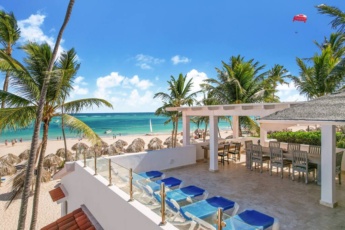
New Bávaro Beach Beachfront Condo for Rent - Stunning Ocean View, Housekeeper & Rooftop Terrace
from $811 night Read more3. Enjoying the Meal
After the hard work in the kitchen, it’s time to savor the fruits of your labor with a delightful sit-down meal, celebrating the flavors and camaraderie fostered during the class.
The culmination of your cooking class is a sit-down meal where you can enjoy the dishes you’ve prepared. This is not just about tasting the food but also about experiencing the essence of Dominican hospitality. Often accompanied by a glass of local rum or a refreshing morir soñando, this meal becomes a shared celebration of culture and culinary achievement. It’s a perfect opportunity to reflect on your cooking journey and enjoy the vibrant flavors that make Dominican cuisine so beloved worldwide.
Choosing the Right Culinary Instructor
Selecting the perfect culinary instructor is a pivotal step in ensuring a memorable and enriching cooking class experience during your stay in a rental villa. The right instructor can transform a simple cooking lesson into an unforgettable journey through the flavors and traditions of Dominican culture.
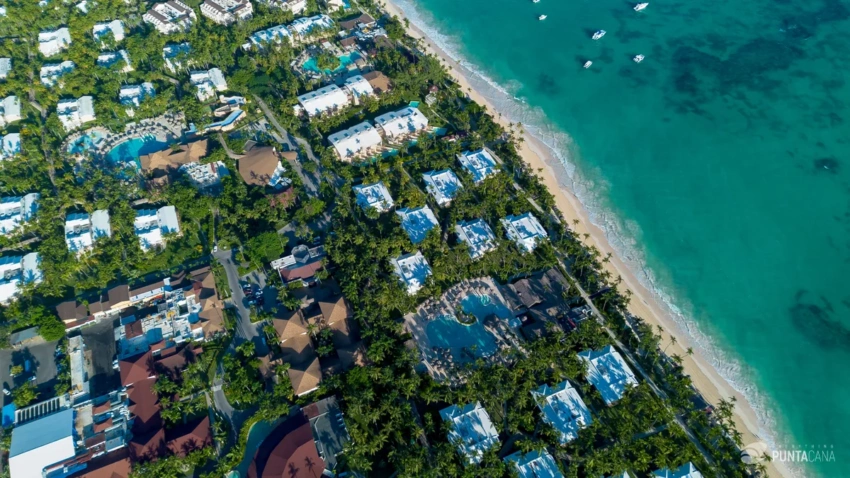
Punta Cana, drone view
1. Researching Credentials and Experience
When choosing a culinary instructor, it is essential to delve deeply into their professional background and expertise. A well-qualified instructor will not only have substantial experience in Dominican cuisine but also possess a diverse culinary background that enriches their teaching.
- Start by reviewing their professional history, including any formal culinary education and certifications they may hold.
- Look for an instructor who has a wealth of experience in teaching cooking classes, as this indicates their ability to effectively communicate and instruct.
- Consider instructors who have received accolades or recognition in the culinary field, as this often reflects a high level of skill and dedication.
Additionally, examine client reviews and testimonials to gain insight into previous participants’ experiences. Positive reviews can highlight the instructor’s strengths, such as their teaching style, ability to engage participants, and overall class satisfaction.
2. Assessing Compatibility
Compatibility between the instructor and participants is crucial for a successful and enjoyable cooking class. Consider the following factors when assessing compatibility:
- Teaching Style: Every instructor has a unique teaching style. Some may be more hands-on, while others provide more guidance and support. Determine which style aligns best with your learning preferences.
- Personality: A friendly and approachable instructor can make the class more enjoyable and comfortable. Look for someone who is enthusiastic about sharing their knowledge and culture.
- Adaptability: Choose an instructor who is willing to tailor the class to your skill level and interests, ensuring a personalized experience.
Ultimately, the right instructor will create a welcoming atmosphere that encourages participants to explore and experiment with Dominican culinary techniques.
3. Understanding Class Offerings
When selecting a culinary instructor, it is important to understand the variety of class offerings available. This ensures that the class aligns with your culinary interests and expectations.
- Variety of Classes: Instructors may offer a range of classes, from traditional Dominican dishes to fusion cuisine that incorporates international influences. Choose a class that piques your interest and fits your culinary aspirations.
- Specializations: Some instructors may specialize in certain areas, such as desserts, seafood, or vegetarian dishes. Selecting an instructor with expertise in a specific area can enhance the learning experience.
- Duration and Format: Determine whether the class is a one-time session or a series of classes. Also, consider the format—whether it is a private one-on-one class or a small group session, as this will affect the level of attention and interaction.
Our Experienced Culinary Instructors in Punta Cana
Discover the culinary expertise of our instructors who offer a delightful journey through Dominican cuisine. Their classes provide not only cooking skills but also cultural insights that enrich your culinary adventure.
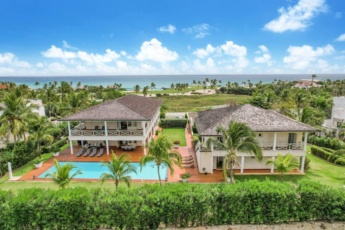
Private Cap Cana Caleton Villa with Large Pool, Ocean View, and Top Amenities
from $2246 night Read more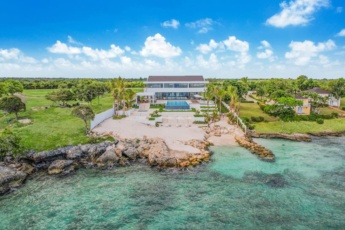
New & Luxury Casa de Campo Oceanfront Villa - With Private Beach, Large Pool, Top Amenities
from $14820 night Read moreMaximizing Your Dominican Culinary Experience
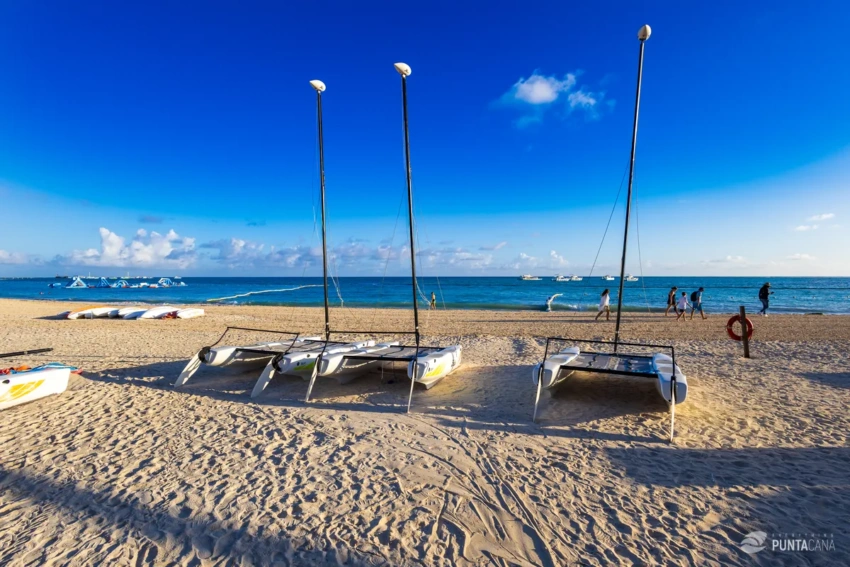
Punta Cana
To truly savor the essence of Dominican cuisine, consider enhancing your cooking class with a blend of cultural activities and sensory experiences. By incorporating local elements, you can create an unforgettable culinary journey that goes beyond the kitchen.
1. Pairing with Local Drinks
Dominican cuisine is not just about the food; it’s also about the vibrant drinks that accompany each meal. From the refreshing Morir Soñando to the traditional Mamajuana, understanding the art of pairing local beverages with your dishes can elevate your dining experience.
Popular Dominican Beverages
| Drink | Ingredients | Ideal Pairing | Unique Feature |
|---|---|---|---|
| Morir Soñando | Orange juice, milk, sugar | Breakfast or light lunch | Creamy and citrusy |
| Mamajuana | Rum, red wine, honey, herbs | Hearty stews and meats | Herbal and spicy |
| Limoncillo | Lime, sugar, water | Seafood dishes | Refreshing and tangy |
Consider starting your cooking class with a brief introduction to these drinks, allowing participants to prepare and taste them alongside their meals. This not only enhances the flavor profiles of the dishes but also provides a fuller cultural immersion.
2. Exploring Local Markets
No culinary experience is complete without a visit to a local market. Dominican markets are bustling hubs where you can find fresh produce, exotic fruits, and unique spices that are essential to authentic Dominican cooking.
Guided tours of these markets can offer insights into the local way of life and the significance of each ingredient. Engage with local vendors, sample tropical fruits like guava and papaya, and perhaps even pick up a few cooking tips from experienced locals.
Purchasing ingredients directly from the market ensures that your cooking class is not only authentic but also supports local farmers and the community, making your culinary adventure more sustainable and meaningful.
3. Incorporating Music and Dance
Dominican culture is vibrantly expressed through its music and dance, and incorporating these elements into your cooking class can add a lively and joyful atmosphere. Traditional music genres such as Merengue and Bachata are deeply ingrained in Dominican society and are often played during gatherings and celebrations.
Consider starting or ending your cooking session with a dance lesson or simply playing Dominican music in the background. This not only enriches the experience but also provides a deeper connection to the culture, allowing participants to feel the rhythm and energy that embodies the Dominican spirit.
Our Best Villa Rentals for Cultural Culinary Experiences in Punta Cana
Imagine experiencing these cultural delights in the comfort of a luxurious villa in Punta Cana, where you can embrace the full spectrum of Dominican culinary arts. Our villas offer the perfect setting for a private cooking class that seamlessly integrates local flavors with cultural traditions.
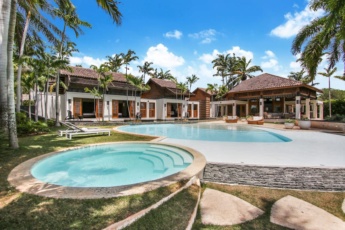
Casa de Campo Modern Villa for Rent - All-Inclusive Ocean View Villa with Chef, Butler & Maid
from $4493 night Read more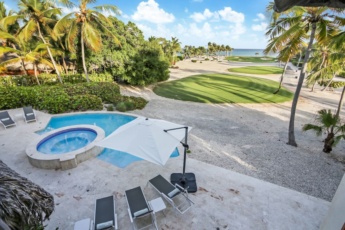
All-Inclusive Ocean View Cap Cana Villa With Chef, Butler, Maid, Pool, Jacuzzi & Eden Roc Beach Access
from $2364 night Read moreFrequently Asked Questions
What can I expect from a private cooking class in my rental villa?
In a private cooking class, you can expect a personalized culinary experience focused on Dominican cuisine. An experienced chef will come to your villa, bringing fresh ingredients and teaching you how to prepare traditional dishes. You’ll learn about local spices, cooking techniques, and cultural history.
How do I book a private cooking class in my rental villa?
You can book a private cooking class through local cooking schools or culinary tour companies in the Dominican Republic. Some rental villas may also offer to arrange these services for you. It’s best to book in advance to secure availability.
What types of dishes will I learn to cook?
You will learn to cook a variety of traditional Dominican dishes such as mofongo, sancocho, and tostones. Classes can be customized to include specific dishes you’re interested in. Don’t forget to ask about learning how to make local desserts and drinks like flan or mamajuana.
Is prior cooking experience necessary to take a class?
No prior cooking experience is required.
Classes are tailored to your skill level, whether you’re a novice or an experienced cook looking to expand your repertoire.
The chef will guide you step-by-step through each recipe.
Are ingredients included in the cooking class fee?
Typically, all necessary ingredients are included in the cooking class fee. The chef will bring fresh, local ingredients to your villa. It’s advisable to confirm this detail when booking your class to avoid any surprises.
Can dietary restrictions be accommodated in the cooking classes?
Yes, most chefs can accommodate dietary restrictions or preferences, such as vegetarian, vegan, or gluten-free options.
Be sure to communicate any dietary needs when booking your class to ensure a seamless experience.
How long does a typical cooking class last?
A typical private cooking class lasts about 2 to 3 hours. This includes time for preparation, cooking, and enjoying the meal you’ve made. The duration can often be customized based on your preferences and the complexity of the dishes.
What should I wear to a private cooking class?
Wear comfortable clothing and closed-toe shoes, as you’ll be standing and cooking for an extended period. An apron is usually provided by the chef, but you can bring your own if you prefer.
Is a private cooking class suitable for families or groups?
Yes, private cooking classes are an excellent activity for families or groups. They provide a fun, interactive way to learn about Dominican culture together. Make sure to mention the size of your group when booking, as this can affect pricing and logistics.
